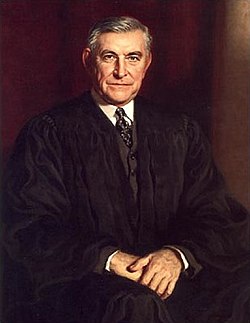
In U.S. Supreme Court history, "The switch in time that saved nine" is the phrase—originally a quip by humorist Cal Tinney[1]—about what was perceived in 1937 as the sudden jurisprudential shift by associate justice Owen Roberts in the 1937 case West Coast Hotel Co. v. Parrish.[2] Conventional historical accounts portrayed the Court's majority opinion as a strategic political move to protect the Court's integrity and independence from President Franklin Roosevelt's court-reform bill (also known as the "court-packing plan"), but later historical evidence gives weight to Roberts' decision being made immediately after oral arguments, much earlier than the bill's introduction.
The term itself is a reference to the aphorism "a stitch in time saves nine", meaning that preventive maintenance before something breaks is less work than fixing that thing after it breaks.[3]
- ^ Barrett, John Q. "Attribution Time: Cal Tinney's 1937 Quip, "A Switch in Time'll Save Nine,"". SSRN. Social Science Research Network. SSRN 3586608. Retrieved 29 April 2020.
- ^ 300 U.S. 379 (1937)
- ^ The New Dictionary of Cultural Literacy, Third Edition Archived 2007-01-18 at the Wayback Machine